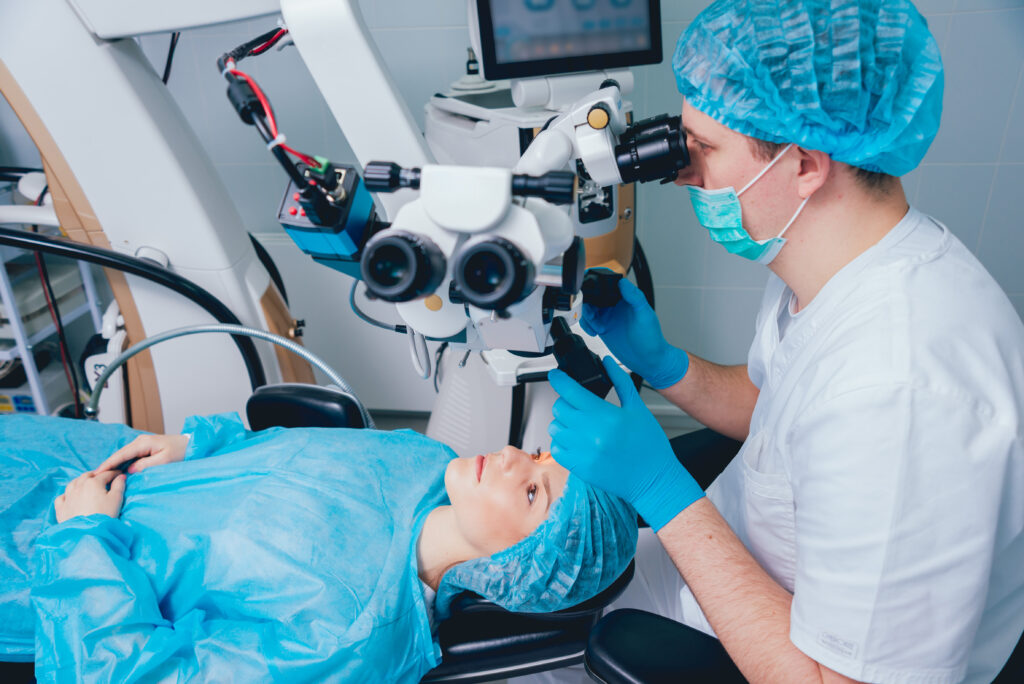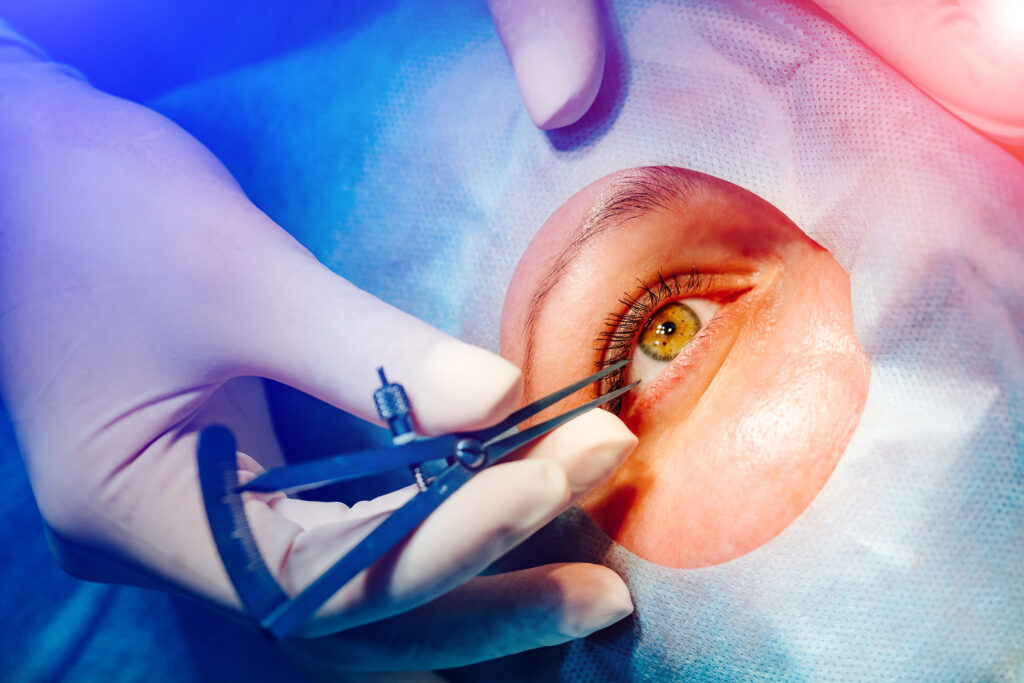Corneal Transplant
- Home
- Corneal Transplant
Netrodaya The Eye City Varanasi
Welcome to Netrodaya’s Corneal Transplant and Cornea Care section. As North India’s largest eye hospital, we are dedicated to providing comprehensive care for a wide range of corneal conditions. Our team of expert ophthalmologists and surgeons are equipped with state-of-the-art technology to offer the highest quality of care for our patients.
Corneal Transplant and Cornea-Related Problems
Common Corneal Conditions
1. Keratoconus
Keratoconus is a progressive eye disease where the cornea thins and bulges into a cone-like shape, causing distorted vision. Symptoms include blurred vision, sensitivity to light, and frequent changes in eyeglass prescriptions. Treatment options range from corrective lenses to corneal cross-linking and, in severe cases, corneal transplant.
2. Corneal Infections
Corneal infections, or keratitis, can be caused by bacteria, viruses, fungi, or parasites. Symptoms include redness, pain, blurred vision, discharge, and light sensitivity. Prompt medical treatment is crucial to prevent scarring and vision loss.
3. Corneal Dystrophies
These are a group of genetic, often progressive, disorders that affect the cornea. They cause the gradual accumulation of abnormal material in the cornea, leading to cloudy vision and other symptoms. Common types include Fuchs’ dystrophy and lattice dystrophy.
4. Corneal Ulcers
A corneal ulcer is an open sore on the cornea, typically resulting from an infection. It can cause severe pain, redness, discharge, and reduced vision. Immediate medical attention is necessary to treat the infection and prevent complications.
5. Corneal Scarring
Scarring can occur due to injury, infection, or previous eye surgery, leading to vision impairment. Depending on the severity, treatment options may include medications, laser therapy, or corneal transplant.


Types of Corneal Transplants
1. Penetrating Keratoplasty (PK) This is a full-thickness transplant where the damaged cornea is replaced with a healthy donor cornea. It is typically used for advanced keratoconus, severe corneal scarring, and certain corneal dystrophies.
2. Endothelial Keratoplasty (EK) This partial-thickness transplant involves replacing only the innermost layer of the cornea, the endothelium. Types of EK include Descemet’s Stripping Endothelial Keratoplasty (DSEK) and Descemet’s Membrane Endothelial Keratoplasty (DMEK). EK is preferred for conditions like Fuchs’ dystrophy and other endothelial disorders.
3. Deep Anterior Lamellar Keratoplasty (DALK) This procedure replaces the front and middle layers of the cornea while preserving the healthy endothelium. DALK is often used for keratoconus and superficial corneal scarring.
4. Anterior Lamellar Keratoplasty (ALK) Similar to DALK, ALK involves replacing only the outer layers of the cornea. It is used for superficial corneal diseases that do not affect the endothelium.
The Corneal Transplant Procedure
1. Pre-Operative Assessment A thorough pre-operative evaluation is conducted, including detailed eye examinations, imaging tests, and a review of your medical history. This ensures that you are a suitable candidate for the procedure and helps in planning the surgery.
2. Donor Cornea The donor cornea is sourced from an eye bank and thoroughly screened to ensure its suitability and safety for transplantation.
3. Surgery The transplant procedure is performed under local or general anesthesia. The damaged portion of your cornea is carefully removed and replaced with the healthy donor cornea, which is then secured with fine sutures.
4. Post-Operative Care After surgery, you will need to use prescribed medications to prevent infection and reduce inflammation. Follow-up visits are crucial to monitor the healing process and ensure the success of the transplant. Sutures may be removed gradually over several months.
Recovery and Aftercare
Recovery from a corneal transplant can take several months to a year. During this period:
1. Follow-Up Visits: Regular check-ups are essential to monitor your eye’s healing and detect any signs of rejection or complications.
2. Medications: You will need to use antibiotic and anti-inflammatory eye drops as prescribed by your doctor.
3. Activity Restrictions: Avoid strenuous activities, rubbing your eyes, and exposing your eyes to irritants like dust and smoke.
4. Vision Correction: It may take some time for your vision to stabilize. Glasses or contact lenses might be needed, and in some cases, additional procedures like laser treatment can help fine-tune your vision
Risks and Complications
As with any surgical procedure, corneal transplants carry some risks, including:
• Rejection: The immune system may recognize the donor cornea as foreign and attempt to reject it. Prompt treatment can often reverse rejection.
• Infection: Post-operative infections can occur, requiring immediate medical attention.
• Glaucoma: Increased eye pressure can develop after surgery, potentially leading to glaucoma.
• Astigmatism: Irregular curvature of the cornea may cause blurred vision, which can be corrected with glasses, contact lenses, or further surgery.
Why Choose Netrodaya for Corneal Transplants?
• Experienced Surgeons: Our team of corneal specialists has extensive experience in performing corneal transplants and managing complex corneal conditions.
• Advanced Technology: We use the latest surgical techniques and state-of-the-art equipment to ensure the best outcomes for our patients.
• Comprehensive Care: From pre-operative assessments to post-operative follow-ups, we provide end-to-end care to support your recovery and vision restoration.
• Patient-Centered Approach: We prioritize your comfort and well-being, ensuring that you receive personalized care throughout your treatment journey.
Conclusion
Why Choose Netrodaya for Corneal Transplants?
Experienced Surgeons: Our team of corneal specialists has extensive experience in performing corneal transplants and managing complex corneal conditions.
Advanced Technology: We use the latest surgical techniques and state-of-the-art equipment to ensure the best outcomes for our patients.
Comprehensive Care: From pre-operative assessments to post-operative follow-ups, we provide end-to-end care to support your recovery and vision restoration.
Patient-Centered Approach: We prioritize your comfort and well-being, ensuring that you receive personalized care throughout your treatment journey
Frequently Asked Questions
Cataract are a condition where the clear lens of the eye becomes cloudy or opaque, leading to a gradual decline in vision. This clouding happens due to the clumping of proteins in the lens, often as a result of aging. As cataract develop, they can cause symptoms like blurry vision, difficulty seeing in low light, glare sensitivity, and faded colors. Left untreated, cataract can significantly impact daily activities and may lead to vision loss.
At Netrodaya, specialized cataract treatments and surgeries are available to restore clear vision.
Typical signs of cataract include:
• Having a general haze or blur, as though through frosted glass, is known as blurry vision.
• Night Vision Issues: Having trouble seeing at night due to headlight or streetlight glare.
• Colours that seem more yellowed and less vibrant are called faded colours.
• Increased Sensitivity to Glare: Having trouble with glare from the sun and bright lights.
• Seeing more than one image or a ghosting effect in one eye is known as double vision.
• Regular Prescription Glasses Changes: There is a discernible and regular requirement for updated prescriptions.
A complete eye examination at Netrodaya can aid in the diagnosis of cataract and assist select the most effective course of action to relieve these symptoms.
It could be a period to think about cataract surgery if you're having symptoms like double vision, fuzzy vision, difficulties seeing at night, faded colours, increased sensitivity to glare, or frequent adjustments to your prescription glasses. Through a thorough eye exam, an eye specialist at Netrodaya can define the severity of your cataract. They will consider how much your cataract interfere with your day-to-day activities and choose whether surgery is required to get your vision back to normal.
The most effective treatment for cataract at Netrodaya is cataract surgery, which involves replacing the cloudy lens with a clear artificial lens to restore clear vision.
Cataract surgery at Netrodaya involves removing the cloudy lens and replacing it with a clear artificial lens. This procedure is highly effective for restoring clear vision and improving quality of life.
Cataract surgery at Netrodaya is typically not painful. The process is performed under local anesthesia, which numbs the eye area. Patients may experience mild pain or anxiety but generally report minimal pain during and behind the surgery.
After cataract surgery at Netrodaya, recovery usually involves a few days of rest and avoiding strenuous activities. Patients may experience blurry vision initially, but clearness improves as the eye recovers. Eye drops are prescribed to control infection and reduce inflammation. Regular follow-up appointments ensure proper recovery and optimal vision. Most people resume normal activities within a week or two.
At Netrodaya, many patients start noticing improvement in their vision within a day or two after cataract surgery. However, full visual recovery may take a few weeks as the eye continues to heal and adjust. Follow-up appointments help monitor progress and ensure optimal results. Most people experience significant vision improvement within a week or two.
At Netrodaya, cataract surgery is generally safe, but risks include infection, bleeding, or vision issues like glare or double vision. Improvement is usually noticeable within a day or two, with full recovery taking a few weeks. Regular follow-up helps manage any complications and ensures optimal healing and vision clarity.
After cataract surgery at Netrodaya, avoid heavy lifting, bending over, or strenuous activities for a few weeks. Protect your eyes from dust and bright sunlight, and use prescribed eye drops as directed. Attend follow-up appointments to monitor healing. Gradually resume normal activities while following your doctor’s advice to ensure optimal recovery and prevent complications
